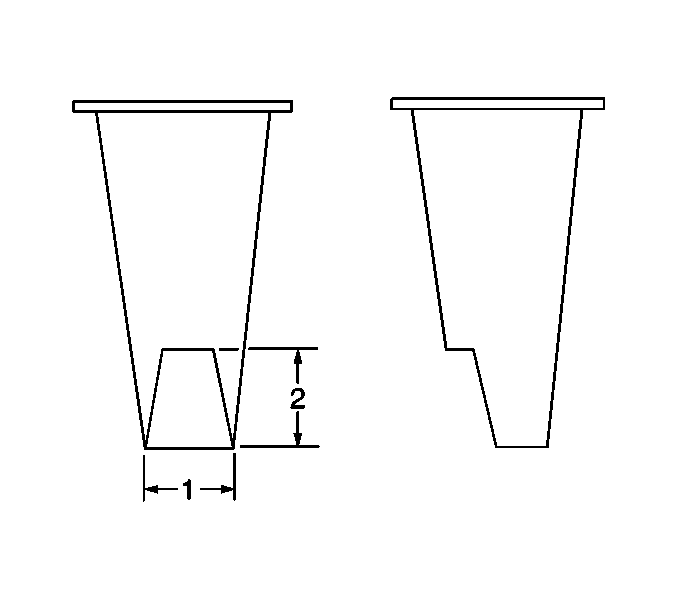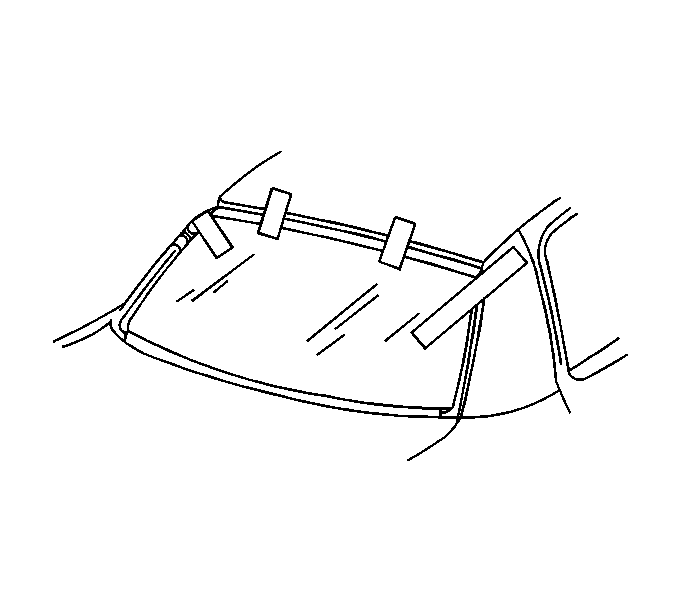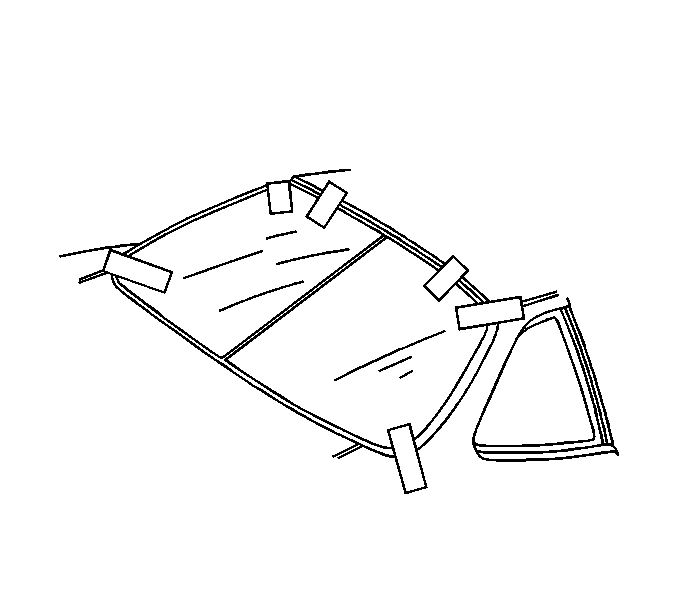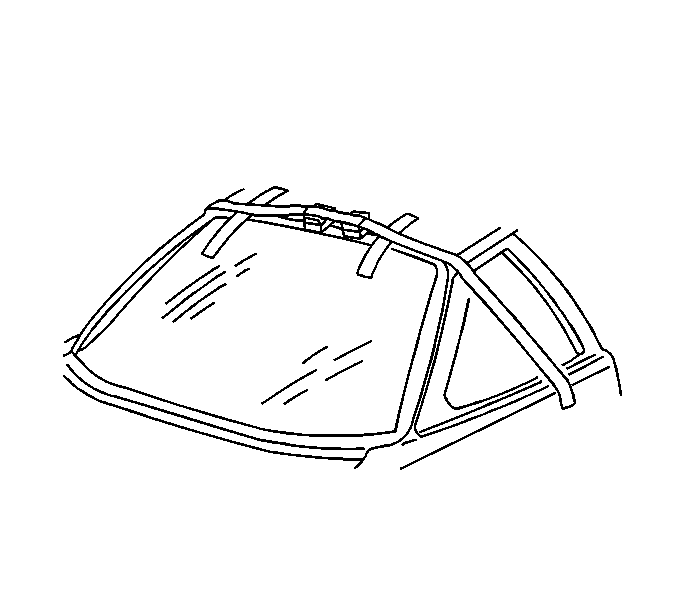Rear Window Replacement Except Buick Coupe
Removal Procedure
Tools Required
Caution: When replacing stationary windows, use Urethane Adhesive Kit GM P/N 12346392
(Canadian P/N 10952983), or a urethane adhesive system meeting GM Specification
GM3651G, to maintain original installation integrity. Failure to use the urethane
adhesive kit will result in poor retention of the window which may allow unrestrained
occupants to be ejected from the vehicle resulting in personal injury.
- Mask off the area around the rear window in order to protect the painted
surfaces.
- Cut the rear window reveal molding in order to allow access to
the body pinchweld.
- Remove the quarter trim panel. Refer to the appropriate procedure
in Interior Trim:
- Remove the rear window panel trim. Refer to
Rear Window Trim Panel Replacement
in Interior
Trim.
- Disconnect the wire connectors from the rear window defogger.
- Use the J 24402-A
(or
equivalent), to cut around the entire perimeter of the rear window.
- Remove the rear window from the vehicle.
- Determine which method will be used for installation:
| • | For the Extended Method, use a sharp scraping tool in order to
remove all urethane from the body pinchweld. |
| • | For the Short Method, use a sharp scraping tool in order to remove
all of the urethane from the rear window. If you are reinstalling the rear
window, use the Short Method whenever possible. |
- Perform the following cleaning procedures:
| 9.1. | Vacuum all of the loose debris. |
| 9.2. | Wipe the body pinchweld flange using a clean dry cloth. |
| 9.3. | Wipe the rear window using a clean dry cloth. |
- Inspect the pinchweld for any metal damage.
Repair all damage before replacing the rear window.
Important:
| • | Refinish the pinchweld flange to a PRIMER ONLY surface under the
following conditions: |
| • | Corrosion of the pinchweld is present |
| • | The sheet metal requires repair or replacement |
| • | For paint repairs, prior to applying the color coat, mask the
flange bonding area in order to provide a PRIMER ONLY surface. |
| • | The appropriate materials for the primer applications are typically
2-component, catalyzed products such as the following: |
| • | Apply the primer using the manufacturer's directions for the following
steps: |
| • | Perform the following procedures after the opening is repaired: |
| • | Shake the pinchweld primer #3 thoroughly |
| • | Use a new dauber to apply the primer to the primed surface of
the flange in the bonding area |
- Allow the area to dry for 10 minutes
Installation Procedure
- Install the rear window reveal molding onto the rear window by
aligning the notch on the rear window reveal molding with the center mark
on the bottom of the rear window.
- Dry fit the glass in the body opening in order to determine the
correct position:
| 2.1. | Position the window in the opening. |
| 2.2. | Use masking tape to mark the location of the glass in the opening
on at least one horizontal edge and one vertical edge. |
| 2.3. | Slit the masking tape at the glass edges. |
Remove the window from the body opening.
| 2.4. | Place the rear window on a clean and protected work area with
the inside surface facing up. |
- If you need to reinstall the original window, remove any existing
urethane adhesive from the edges and the surface of the glass. Use a razor
knife or any other suitable tool.
Clean the surface of the window (around the inside surface) to which
the urethane adhesive is applied.
Use a clean cloth that is damp with one of the following products:
| • | GM glass cleaner GM P/N 1050427 or an equivalent. |
- If the extended installation method is used, apply a dam material
such as Norton Windshield Dam Replacement around the perimeter of the window
in order to control urethane squeeze-out.
Apply the dam approximately 12-18 mm (1/2 -3/4 in)
from the outer edge of the window.
Important: The application of primers is important because primers act as the agent
that bonds the urethane to the rear window. Use the specified primer for each
application in order to ensure proper adhesion.
- If the extended installation method is used, perform the following steps:
| • | Shake the pinchweld primer #3 (black) thoroughly |
| • | Apply the primer to any exposed painted surfaces or scratches
to bare metal on the body of the pinchweld flange |
| • | Allow the primer to dry for 10 minutes |
Important: Use care to prevent glass prep #1 (clear) from running into the vision
area of the glass. The primer dries almost instantly. The primer may stain
the viewing area of the window if not applied evenly.
- If the short installation method is used, do not prime the existing
bead of urethane on the body.
Important:
| • | DO NOT apply clear primer over black primer |
| • | DO NOT touch primer coated surfaces |
- Use a new dauber to apply the glass prep #1 (clear) to approximately
10-16 mm (3/8 - 5/8 in) around the entire perimeter of
the inner window surface and any exposed edges of glass.
Wipe the area dry with a clean cloth.
- Shake the glass primer #2 (black) thoroughly. Use a new dauber
in order to apply the primer to the same areas that glass prep #1 were applied
to.
- Allow the primer to dry for approximately 6 to 10 minutes.

- When using the short installation
method, cut the tip of the application nozzle in order to provide a bead of
approximately 4.5 mm (1/8 in to 3/16 in) diameter.
When using the extended installation method, verify the proper application
nozzle size. Dimension 1 should be 10 mm (3/8 in) and dimension
2 should be 15 mm (5/8 in).

Important: In order to ensure the retention of the rear window reveal molding,
be certain that urethane contacts the following parts:
| • | The rear window reveal molding |
- Apply a smooth and continuous bead of urethane adhesive to the following
areas:
| • | The perimeter of the rear window |
| • | The rear window reveal molding. |
- Using the suction cups supplied in J 36863
and the aid of an assistant, perform the following steps:
| • | Fit the top of the rear window into the rear window opening |
| • | Fit the bottom of the rear window into the rear window opening |
| • | Align the window with the tape marks |
- Press on the rear window firmly in order to wet-out and set the
urethane adhesive.
Use care in order to avoid excessive squeeze-out.

- Tape the rear window at the following points with 2 pieces of
tape in order to prevent the reveal molding from lifting:
| • | At the top of the rear window |

- For the coupe, also tape
the rear window at both lower corners using two pieces of tape in order to
prevent the reveal molding from lifting away from the body.
- Open the rear compartment lid in order to allow the lower level
reveal molding flap to be positioned under the rear deck lid.
- From the passenger compartment, paddle the urethane around the
perimeter of the rear window with a flat bladed tool in order to ensure a
watertight seal.
- Use a soft spray to watertest the window immediately. Warm or
hot water may accelerate the cure of the adhesive.
DO NOT direct high pressure water at fresh urethane adhesive.
- If the window leaks use a flat-bladed tool to apply urethane adhesive
to the leak point and 127 mm (5 in) on both sides of the leak
point.
Important:
| • | Keep the vehicle at the room temperature of 22°C (72°F)
and 30 percent relative humidity for a minimum of 6 hours. |
| • | Lower the door glass partially in order to prevent pressure build
up when the doors are closed before the urethane adhesive has cured. |
| • | Do not drive the vehicle until the urethane is cured (the minimum
6 hours at room temperature). |
| • | Do not use compressed air in order to dry the urethane adhesive. |
- Remove the tape from the rear window after the tape has cured.
- Remove the protective tape.
- Install the wire connectors to the rear window defogger.
- Install the rear window panel trim. Refer to
Rear Window Trim Panel Replacement
in Interior
Trim.
- Install the quarter trim panel. Refer to the appropriate procedure
in Interior Trim:
Rear Window Replacement Buick Coupe
Removal Procedure
Tools Required
Caution: When replacing stationary windows, use Urethane Adhesive Kit GM P/N 12346392
(Canadian P/N 10952983), or a urethane adhesive system meeting GM Specification
GM3651G, to maintain original installation integrity. Failure to use the urethane
adhesive kit will result in poor retention of the window which may allow unrestrained
occupants to be ejected from the vehicle resulting in personal injury.
- Mask off the area around the rear window in order to protect the painted
surfaces.
- Remove the quarter trim panel. Refer to the following procedures
in Interior Trim:
- Remove the rear window panel trim. Refer to
Rear Window Trim Panel Replacement
in Interior
Trim.
- Disconnect the wire connectors from the rear window defogger.
- Use the J 39032
(or
equivalent), to cut around the entire perimeter of the rear window.
- Remove the rear window from the vehicle.
- Determine which method will be used for installation:
| • | For the Extended Method, use a sharp scraping tool in order to
remove all urethane from the body pinchweld. |
| • | For the Short Method, use a sharp scraping tool in order to remove
all of the urethane from the rear window. If you are reinstalling the rear
window, use the Short Method whenever possible. |
- Perform the following cleaning procedures:
| 8.1. | Vacuum all of the loose debris. |
| 8.2. | Wipe the body pinchweld flange using a clean dry cloth. |
| 8.3. | Wipe the rear window using a clean dry cloth. |
- Inspect the pinchweld for any metal damage.
Repair all metal damage before replacing the rear window.
Important:
| • | Refinish the pinchweld flange to a PRIMER ONLY surface under the
following conditions: |
| - | Corrosion of the pinchweld is present |
| - | The sheet metal requires repair or replacement |
| • | For paint repairs, prior to applying the color coat, mask the
flange bonding area in order to provide a PRIMER ONLY surface. |
| • | The appropriate materials for the primer applications are typically
2-component, catalyzed products such as the following: |
| • | Apply the primer using the manufacturer's directions for the following
steps: |
| • | Perform the following procedures after the opening is repaired: |
| - | Shake the pinchweld primer #3 thoroughly |
| - | Use a new dauber to apply the primer to the primed surface of
the flange in the bonding area |
- Allow the area to dry for 10 minutes
Installation Procedure
- Install the rear window reveal molding onto the rear window by
aligning the notch on the rear window reveal molding with the center mark
on the bottom of the rear window.
- Dry fit the glass in the body opening in order to determine the
correct position:
| 2.1. | Position the window in the opening. |
| 2.2. | Use masking tape to mark the location of the glass in the opening
on at least one horizontal edge and one vertical edge. |
| 2.3. | Slit the masking tape at the glass edges. |
Remove the window from the body opening.
| 2.4. | Place the rear window on a clean and protected work area with
the inside surface facing up. |
- If you need to reinstall the original window, remove any existing
urethane adhesive from the edges and the surface of the glass. Use a razor
knife or any other suitable tool.
Clean the surface of the window (around the inside surface) to which
the urethane adhesive is applied.
Use a clean cloth that is damp with one of the following products:
| • | GM glass cleaner GM P/N 1050427 or an equivalent. |
- If the extended installation method is used, apply a dam material
such as Norton Windshield Dam Replacement around the perimeter of the window
in order to control urethane squeeze-out.
Apply the dam approximately 12-18 mm (0.50-0.75 in)
from the outer edge of the window.
Important: The application of primers is important because primers act as the agent
that bonds the urethane to the rear window. Use the specified primer for each
application in order to ensure proper adhesion.
- If the extended installation method is used, perform the following steps:
| • | Shake the pinchweld primer #3 (black) thoroughly |
| • | Apply the primer to any exposed painted surfaces or scratches
to bare metal on the body of the pinchweld flange |
| • | Allow the primer to dry for 10 minutes |
Important: Use care to prevent glass prep #1 (clear) from running into the vision
area of the glass. The primer dries almost instantly. The primer may stain
the viewing area of the window if not applied evenly.
- If the short installation method is used, do not prime the existing
bead of urethane on the body.
Important:
| • | DO NOT apply clear primer over black primer |
| • | DO NOT touch primer coated surfaces |
- Use a new dauber to apply the glass prep #1 (clear) to approximately
10-16 mm (3/8-5/8 in) around the entire perimeter of the
inner window surface and any exposed edges of glass.
Wipe the area dry with a clean cloth.
- Shake the glass primer #2 (black) thoroughly. Use a new dauber
in order to apply the primer to the same areas that glass prep #1 were applied
to.
- Allow the primer to dry for approximately 6-10 minutes.

Important: In order to ensure the retention of the rear window reveal molding,
be certain that urethane contacts the following parts:
| • | The lower portion of the rear window reveal molding |
- When using the short installation method, cut the tip of the application
nozzle in order to provide a bead of approximately 7 mm (¼ in)
in diameter.
When using the extended installation method, verify the proper application
nozzle size. Dimension 1 should be 10 mm (3/8 in) and dimension 2
should be 15 mm (5/8 in).

- Apply a smooth and continuous
bead of urethane adhesive to the following areas:
| • | The perimeter of the rear window |
| • | The rear window reveal molding. |
- Using the suction cups supplied in J 36863
and the aid of an assistant, perform the following steps:
| • | Fit the top of the rear window into the rear window opening |
| • | Fit the bottom of the rear window into the rear window opening |
| • | Align the window with the tape marks |
- Press on the rear window firmly in order to wet-out and set the
urethane adhesive.
Use care in order to avoid excessive squeeze-out.

- Tape the rear window at
the top with 2 pieces
of tape in order to prevent the reveal molding from lifting away from the
body.
- Apply 2 foam blocks to the top edge of the rear window reveal
molding.
- Tape over the foam blocks and both of the quarter windows.
- Open the rear compartment lid in order to allow the lower level
reveal molding flap to be positioned under the rear deck lid.
- From the passenger compartment, paddle the urethane around the
perimeter of the rear window with a flat bladed tool in order to ensure a
watertight seal.
- Use a soft spray to watertest the window immediately. Warm or
hot water may accelerate the cure of the adhesive.
DO NOT direct high pressure water at fresh urethane adhesive.
- If the window leaks use a flat-bladed tool to apply urethane adhesive
to the leak point and 127 mm (5 in) on both sides of the leak
point.
Important:
| • | Keep the vehicle at the room temperature of 22°C (72°F)
and 30 percent relative humidity for a minimum of 6 hours. |
| • | Lower the door glass partially in order to prevent pressure build
up when the doors are closed before the urethane adhesive has cured. |
| • | Do not drive the vehicle until the urethane is cured (the minimum
6 hours at room temperature). |
| • | Do not use compressed air in order to dry the urethane adhesive. |
- Remove the tape from the rear window after the tape has cured.
- Remove the protective tape.
- Install the wire connectors to the rear window defogger.
- Install the rear window panel trim. Refer to
Rear Window Trim Panel Replacement
in Interior
Trim.
- Install the quarter trim panel. Refer to the following procedures
in Interior Trim:







